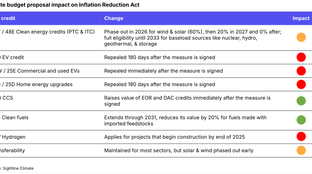
🌎 Overheard at LCAW #252
Climate, capital, and carrots in London's new playbook
Happy Monday!
It’s our 200th edition — thanks for opening your inbox to us for so long. Here’s to 200 more. 🎉
Last week, Lazard released its annual levelized cost of energy (LCOE) report for 2024, highlighting a leveling out of renewables cost curves as higher interest rates continue to apply pressure.
In other news, European renewables are cannibalizing power prices; UK traders are speculating on carbon credits ahead of its election; and New York made a U-turn on congestion pricing.
In deals, $218m for home energy efficiency; $210m for biocarbon and biohydrogen; and $100m for laser compression fusion.
Plus, some Sightline Climate updates: We’re taking this Friday off, so expect us back next Monday. And we’re hiring for a Product Designer and Research Lead (check out our Careers page for more).
Thanks for reading!
Not a subscriber yet?
📩 Submit deals and announcements for the newsletter at [email protected].
💼 Find or share roles on our job board here.
Lazard dropped its annual Levelized Cost of Energy (LCOE) report for 2024 last week, with energy wonks quickly poring over the fine print to understand the changing supply, demand, and financing currents on renewables development.
Levelizing the playing field
LCOE calculates the lifetime costs of building and operating any kind of power plant, divided by its energy production. This helps to compare different technologies (e.g., wind, solar, natural gas) with varying lifespans, project sizes, capital costs, risks, returns, and capacity factors.
It can also be a useful heuristic for investors, who can compare average market prices to the LCOE of a potential project to gauge whether a project is in the green. However, it's not the only metric that matters: It doesn't account for certain key scaling factors, such as space requirements, geographical dependencies (like geothermal heat availability), or power price cannibalization. For instance, additional wind capacity can lead to higher curtailment of existing resources, reducing their output and raising LCOE.
Lazard's 2024 report examines LCOE in the US and includes the levelized costs of storage and hydrogen. This year, it highlights how macroeconomic forces, such as interest rates and the rise of AI, impact clean energy development.
What it says
Key takeaways
🥩 Prolific Machines, a San Francisco, CA-based cultured meat maker, raised $55m in Series B funding from Breakthrough Energy Ventures, Conti Ventures, Darco Capital, Fonterra The Ki Tua Fund, In-Q-Tel, and others.
⚡ Octopus Energy, a London, England-based renewable energy supplier, raised Growth funding from Galvanize Climate Solutions and Lightrock.
⚡ Xcimer Energy Corporation, a Denver, CO-based laser compression fusion energy developer, raised $100m in Series A funding from Breakthrough Energy Ventures, Emerson Collective, Gigascale Capital, Hedosophia, Lowercarbon Capital, and others.
☔ Understory, a Madison, WI-based climate risk analytics and insurance platform, raised $15m in Series A funding from Prelude Ventures and True Ventures.
⚡ Qargo, a London, England-based fleet management software platform, raised $13m in Series A funding from Balderton Capital.
🔋 SiTration, a Cambridge, MA-based next-gen materials extractor, raised $12m in Seed funding from 2150, Azolla Ventures, BHP Ventures, Extantia Capital, Orion Industrial Ventures, and The E14 Fund.
☔ Mitiga Solutions, a Barcelona, Spain-based climate risk and resilience platform, raised $8.7m in Series A funding from CREAS Impacto, Elaia, and Kibo Ventures.
📦 Dealt, a Paris, France-based circular economy SaaS platform, raised $6.5m in Series A funding from GO CAPITAL, Holnest, La Poste Ventures, and One Green.
🧱 ecoLocked, a Berlin, Germany-based CO2-optimized building materials maker, raised $4.3m in Seed funding from Climentum Capital, Counteract, Matterwave Ventures, SFO, Sabanci Building Solutions, and Voyagers Climate Tech Fund.
🌾 IntelliCulture, a Kitchener, Canada-based farm management software platform, raised **$3.5m** in Seed funding from Emmertech, Serra Ventures, and Tall Grass Ventures.
🌱 LogicLadder, a Gurgaon, India-based sustainability management platform, raised $2.5m in Series A funding from BIG Capital LLC, IIML - Enterprise Incubation Centre, ONGC, Rainmatter Capital, and Shell Ventures.
🏠 Aira, a Stockholm, Sweden-based home energy efficiency platform, raised $218m in Debt funding from BNP Paribas.
⚡ Aymium, a Gwinn, MI-based biocarbon and biohydrogen producer, raised $210m in Project Finance funding from Copenhagen Infrastructure Partners, ECP ForeStar, Hokuriku Electric, Japan Green Investment Corporation for Carbon Neutrality, and Nippon Steel Trading.
⚡ HydrogenPro, a Porsgrunn, Norway-based hydrogen electrolyzers developer, raised $5.1m in Grant funding from Export and Investment Fund of Denmark.
🛵 Gogoro, a Taoyuan, Taiwan-based electric scooters and battery swapping platform, raised $50m in Post-IPO equity funding from Gold Sino Assets Limited.
⚡ Energy Park, a Harpenden, England-based smart EV charging solutions platform, raised $45m in PE Expansion funding from Zouk Capital.
🐄 eFishery, a Bandung, Indonesia-based aquaculture technology company, raised $30m in Debt funding from HSBC.
Creandum, a Stockholm, Sweden-based investment firm, held a final close of their $543m fund that invests in early-stage companies.
Pollination, a London, UK-based investment firm, held a final close for their $150m fund that invests in early-stage companies working on climate and nature-based solutions.
Can’t get enough deals? See full listings and deal analytics on Sightline Climate
Europe’s power markets have been experiencing frequent negative electricity prices due to an oversupply from productive solar and wind sources. This trend of power price cannibalization, where building renewables creates conditions that disincentive more development, raises concerns among investors about how much more renewable power can be built into the $800bn market.
Traders placed heavy bets on a rise in UK carbon credit prices, anticipating stricter climate policies from a potential incoming Labour government. The benchmark price for UK carbon allowances has increased by 9% since the election was called.
The majority of EU countries pushed to dilute new rules designed to prevent greenwashing, amid mounting political pressure to ease the bloc's climate legislation. This move comes as the EU prepares for elections, with the Green Deal's stringent measures becoming a contentious campaign issue.
The US DOE announced a National Definition for Zero Emissions Buildings as energy efficient, free of onsite emissions from energy use, and powered solely from clean energy. Elsewhere in DOE, the Office of Fusion Energy Sciences intensified its support for fusion research with an additional $180m in funding.
A new IEA report showed global investment in clean energy is projected to reach $2 trillion in 2024, nearly double that of fossil fuels. While improved supply chains and reduced technology costs are driving this positive development, new clean energy projects must still overcome high financing costs, especially in emerging and developing economies.
New York took a U-turn on congestion pricing: NY Gov. Kathy Hochul decided to halt congestion pricing, missing an opportunity to reduce emissions and support public transit. The plan, which was set to charge $15 a day for cars entering Manhattan, faced opposition due to concerns over its impact on low-income drivers and political considerations in suburban districts.
A signal of advanced geothermal progress, Massachusetts launched the first utility-operated underground thermal energy network in the US, to shift from gas utilities to clean heat in a pilot project in Framingham, MA. The $14m project, which uses geothermal wells to supply heat to buildings, will serve as a critical test for scaling similar initiatives nationwide.
WSJ takes on the FOAK challenge.
Oh, the irony of the CEO of a SAF company embezzling millions to buy a Mercedes and Range Rover.
Can new Mexico president Sheinbaum's green dreams take root, or will they hit rock bottom like Indian PM Modi's groundwater dilemma?
Oxford Smith School just published the 2nd Edition of “The State of Carbon Dioxide Removal.”
A longread on the mafia-like underworld of carbon emissions traders.
It’s almost Father’s Day, and for the dads, electric lawnmowers might be the gateway to home electrification.
Man-made materials now outweigh the mass of the natural world.
Cloud-brightening experiment goes dark in the Bay.
Move aside, flamethrowers — Tesla's sparking up the party with $450 mezcal bottles!
“Requiem in Power:” Spain’s RIP initiative to turn cemeteries into 440,000-kW solar powerhouses by 2030.
A new report found carbon offsets took a 61% nosedive in value.
We’ll need more copper in the next 30 years than we’ve ever mined.
📅 London Tech Week: Register to attend London Tech Week on June 10-12th to engage with innovators, investors, and tech companies.
📅 Climate Tech Summit UK: Register to attend the 2024 Climate Tech Conference on June 12-13th to network with hundreds of delegates and climate tech professionals.
📅 Hack Summit: Register to attend the Hack Summit from June 13-14th in Switzerland for two days of networking and deal-making with climate founders, funders, and LPs.
📅 London Climate Action Week: London’s own climate week will be June 22-30th with 200+ in-person and virtual events and 45,000+ attendees. If you’re in town, shoot us a note!
💡 Environmental Tech Lab: Apply to participate in the 2024 Environmental Tech Lab Data Management or Resilience cohort by August 1 for an opportunity to engage with and discuss innovative solutions with the NYC Department of Environmental Protection (DEP).
Product Designer, Research Lead, Research Analyst, Data Scientist, Data Product Manager @Sightline Climate
Chief Financial Officer @Greentown Labs
Energy Systems Engineer @Sesame Sustainability
Climate Technology Investor @Vectors Capital
Accounting Associate @Clean Energy Ventures
Vice President of Engineering @Relyion Energy Inc
Head of Strategy @Dioxycle
Analyst @Energy Capital Ventures
📩 Feel free to send us deals, announcements, or anything else at [email protected]. Have a great week ahead!

Climate, capital, and carrots in London's new playbook

US plays popcorn politics with biofuels and beyond

Groundbreaking results from the geothermal developer’s main project